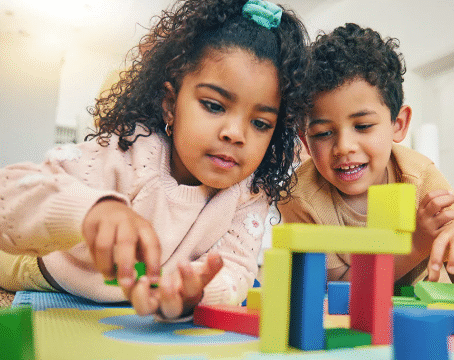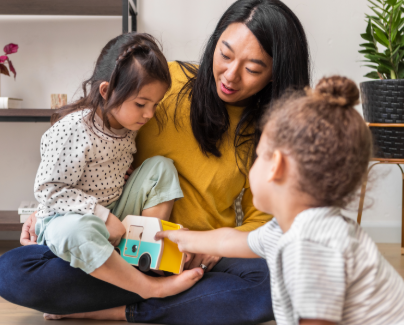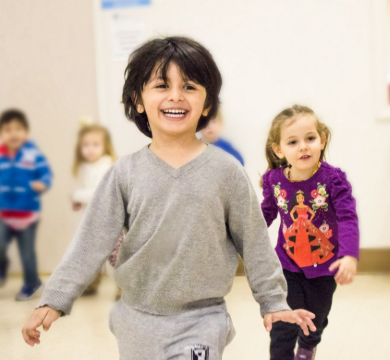Helping children learn about sharing and building healthy friendships is one of the most rewarding parts of parenting and caregiving. These early lessons not only shape how children treat others but also influence how they see themselves in the world. When kids grow up understanding the importance of kindness, fairness, and respect, they carry those values into their future relationships. By approaching this topic in warm and encouraging ways, parents and teachers can make sharing and friendship-building a natural and enjoyable part of daily life.
Children are naturally curious about the people around them. From the time they are very young, they begin noticing how others act and how their own behavior can affect playtime or group activities. It is during these moments that children can start learning about sharing. Sharing can be as simple as letting a friend use a crayon, taking turns with a toy, or saving a piece of a snack for a sibling. While small, these actions build the foundation for greater social skills. It is not only about giving up something but also about recognizing the happiness that comes from making someone else feel included.
Friendships play a special role in this process. A healthy friendship gives children the chance to practice empathy, patience, and cooperation. Kids who learn how to be good friends often grow into adults who value teamwork and understanding. Friendship also provides emotional support, especially during times when children face challenges at school or in other parts of life. The comfort of knowing they have someone to rely on can boost confidence and resilience.
Parents and caregivers can guide children toward these skills in everyday interactions. One of the most effective ways is by modeling the behavior themselves. When kids see adults sharing, whether it is food, time, or even just a smile, they absorb that example. Adults who speak kindly, take turns, and show respect for others give children a living picture of how to build positive connections. Children often learn best by watching rather than by listening to instructions alone.
Playtime offers a wonderful opportunity for teaching both sharing and friendship skills. Games that involve taking turns, like board games or outdoor activities, teach fairness in a fun way. Group play encourages cooperation, while simple activities such as building a block tower together show kids the joy of teamwork. When a child experiences how much more enjoyable an activity becomes when done together, the idea of sharing begins to feel natural rather than forced.
It is also important to talk with children about how they feel when they share or when someone shares with them. These conversations help kids connect their actions with emotions, making the lesson more meaningful. For example, if a child gives their toy to a friend and notices the friend smiling, parents can gently point out, “Your friend looks really happy because you shared.” This connection between cause and effect helps children understand the positive impact they can have on others.
Friendships, just like sharing, sometimes come with challenges. Disagreements or hurt feelings are normal, and learning how to handle them is part of building healthy bonds. Parents can support children by teaching them problem-solving skills. Encouraging kids to use kind words, listen to each other, and find solutions together helps them see that conflicts do not have to end friendships. Instead, these moments can strengthen relationships when handled with patience and respect.
Another key part of healthy friendships is understanding boundaries. Children should learn that being a good friend does not mean giving up everything or agreeing to things that make them uncomfortable. Just as sharing is important, so is learning how to say no kindly when needed. Parents can help by explaining that it is okay to have personal space, favorite items, or moments when they want to play alone. Healthy friendships are balanced, with both children feeling respected and valued.
Schools and communities also play a role in shaping how children view sharing and friendships. Classroom activities that encourage group projects, discussions about kindness, or recognition of students who show helpful behavior can reinforce what children are learning at home. Community events, sports teams, and clubs offer real-life opportunities for kids to practice these skills while meeting new friends from different backgrounds. Exposure to diverse friendships helps children learn tolerance and appreciation for differences.
Encouragement is essential along the way. When children demonstrate acts of sharing or show kindness toward friends, positive reinforcement makes a big difference. Simple words like “I’m proud of how you included your friend” or “That was very thoughtful of you to share” help children connect good behavior with positive feedback. Over time, they begin to value these actions not just for the praise but because they see themselves as caring individuals.
It is natural for children to sometimes struggle with sharing or to have moments of selfishness. These situations should be seen as learning opportunities rather than failures. Patience from parents and teachers allows children to gradually develop these skills at their own pace. With consistent guidance, kids come to understand that sharing is not about losing something but about gaining connection and joy. Friendships, too, become less about competition and more about support and togetherness.
As children grow older, the lessons of sharing and friendship evolve. In early childhood, the focus may be on toys and playtime, but as they enter school years, it becomes about cooperation on projects, helping classmates, and navigating more complex social circles. In adolescence, friendships deepen further, requiring trust, honesty, and respect. Each stage builds on the earlier foundation, showing just how important it is to start nurturing these values from a young age.
Ultimately, teaching kids about sharing and healthy friendships is about preparing them for life. These are not just childhood lessons but lifelong skills that shape how they interact in families, workplaces, and communities. A child who learns to share and value friendships becomes an adult who contributes positively to society. They are more likely to form strong, supportive relationships, resolve conflicts peacefully, and show kindness to those around them.
Parents, teachers, and communities all play vital roles in guiding children toward these goals. By offering consistent examples, providing opportunities to practice, and giving encouragement along the way, adults can make the lessons of sharing and friendship enjoyable and lasting. In the end, what children take with them is more than just the memory of toys or playdates. They carry forward the knowledge that kindness matters, friendships are valuable, and sharing brings joy not only to others but also to themselves. This gift, once learned, stays with them throughout their lives, helping them build meaningful relationships and a sense of belonging wherever they go.






